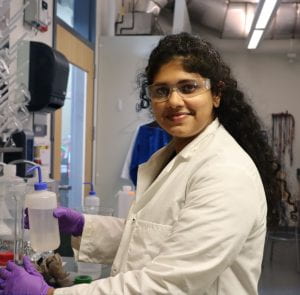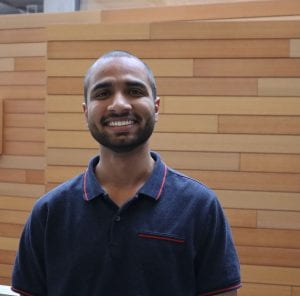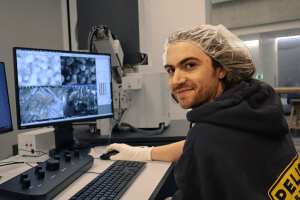 Paul Kempler is an Assistant Professor in Chemistry and the Director of the Oregon Center for Electrochemistry. A Portland native, he moved to Nashville to double major in Chemical Engineering and Chemistry at Vanderbilt University under the supervision of Prof. Paul Laibinis and Prof. Kane Jennings. He completed his Ph.D. with Prof. Nathan Lewis at the California Institute of Technology in 2020 in Chemical Engineering, studying solar fuels devices converting water, sunlight, and CO2 into hydrogen and hydrocarbons. His thesis investigated high-aspect-ratio features in light-absorbing semiconductors and electrocatalysts opportunities to improve solar fuels device performance. At Oregon, he has developed electrochemical technology laboratory courses integrating advanced experiments with coding in Python as part of the first industrially-focused Master’s program in electrochemistry in the United States. His research interests are broadly described by a desire to (1) understand the fundamentals of electrochemical reactions controlled by ion-transfer and (2) use new electrochemical processes to transform manufacturing and abate global CO2 emissions.
Paul Kempler is an Assistant Professor in Chemistry and the Director of the Oregon Center for Electrochemistry. A Portland native, he moved to Nashville to double major in Chemical Engineering and Chemistry at Vanderbilt University under the supervision of Prof. Paul Laibinis and Prof. Kane Jennings. He completed his Ph.D. with Prof. Nathan Lewis at the California Institute of Technology in 2020 in Chemical Engineering, studying solar fuels devices converting water, sunlight, and CO2 into hydrogen and hydrocarbons. His thesis investigated high-aspect-ratio features in light-absorbing semiconductors and electrocatalysts opportunities to improve solar fuels device performance. At Oregon, he has developed electrochemical technology laboratory courses integrating advanced experiments with coding in Python as part of the first industrially-focused Master’s program in electrochemistry in the United States. His research interests are broadly described by a desire to (1) understand the fundamentals of electrochemical reactions controlled by ion-transfer and (2) use new electrochemical processes to transform manufacturing and abate global CO2 emissions.
Assistant Professor University of Oregon
Director of the Electrochemistry Masters Internship Program
Associate Director, Oregon Center for Electrochemistry
email, linkedin, twitter, google scholar,
office: LISB 430
Curriculum Vitae
Postdoctoral Scholars
Fernanda Brito graduated from the University of British Columbia (UBC) with a Ph.D. in Chemical and Biological Engineering in 2025. Her previous research focused on synthesizing polymer exchange membranes (PEMs) using cellulose and lignin as low-cost, eco-friendly alternatives to produce bio-based PEMs for application in redox flow batteries. In the Kempler group, she is studying the electrocatalytic performance of dimensionally stable anodes for the chlorine evolution reaction (CER). Additionally, she is working on scaling up the chlor-iron process for the commercial and sustainable production of iron and chlorine.
Graduate Students

Manasa Rajeev graduated from University of Kerala with a degree in General Chemistry. At UO, in collaboration with the Boettcher lab and Hgen, she is interested in improving the efficiencies of low-cost alkaline water electrolyzers by studying integrated electrode-membrane architectures built for gas bubble management. Currently, she is investigating catalyst degradation during hydrogen generation from intermittent electricity sourced from wind and solar energy.

Raj Shekhar graduated from the National Institute of Technology, Rourkela with a B.S. + M.S. in Chemistry. He earned an M.S. in Materials Science and Nanotechnology from Université Paris-Saclay where he studied the binuclear activation of water-molecule at transition-metal-based electrocatalysts. His Ph.D. research at Oregon, in collaboration with researchers at Pacific Northwest National Laboratory, is focused on the mechanism of direct metal-oxide-to-metal reduction in concentrated alkaline electrolytes. Raj is co-advised by the Boettcher lab.

Louka Moutarlier graduated from the University of Oregon in 2019 with a B.Sc. in Biochemistry, before working as a high school Chemistry/Physics teacher for two years. In 2021, Louka joined the incoming Chemistry graduate cohort at the University of California, Santa Barbara and earned his M.A. in Chemistry with an emphasis in Chemical Education in 2022. He then returned to UO to join the Electrochemistry Masters Internship Program (class of 2023) where he interned with EnZinc studying advanced anodes for secondary zinc batteries. As a Ph.D. student he is researching metal oxide/metal conversion reactions in alkaline zinc anodes for grid-scale energy storage.
 Andrew Goldman graduated from Lehigh University in 2019 with a BS in Materials Science and Engineering. While at Lehigh, he worked in the lab of Professor Nicholas Strandwitz studying electrostatic phenomena at the interfaces in Metal-Insulator-Semiconductor devices for photovoltaic applications. After graduating, he started a business as a small plant nursery specializing in nut trees and other edible perennials in an effort to facilitate the transition to a more regenerative and carbon-negative food system. Now at the University of Oregon Center for Electrochemistry, Andrew is studying the relationship between process, structure, and properties of iron films electrodeposited using the Chlor-Iron process with the goal of designing full-scale reactors to decarbonize steelmaking.
Andrew Goldman graduated from Lehigh University in 2019 with a BS in Materials Science and Engineering. While at Lehigh, he worked in the lab of Professor Nicholas Strandwitz studying electrostatic phenomena at the interfaces in Metal-Insulator-Semiconductor devices for photovoltaic applications. After graduating, he started a business as a small plant nursery specializing in nut trees and other edible perennials in an effort to facilitate the transition to a more regenerative and carbon-negative food system. Now at the University of Oregon Center for Electrochemistry, Andrew is studying the relationship between process, structure, and properties of iron films electrodeposited using the Chlor-Iron process with the goal of designing full-scale reactors to decarbonize steelmaking.
 Stern, E graduated from Western Washington University with a BS in chemistry in 2023. They have a background in heterogenous catalysis and surface chemistry, and their interests are in transport phenomena. As a Ph.D. student at UO, they are studying fundamental ion transfer kinetics at the electrode-electrolyte boundary using the deposition of well-ordered monolayers on single crystal surfaces in the presence of surface/solution species.
Stern, E graduated from Western Washington University with a BS in chemistry in 2023. They have a background in heterogenous catalysis and surface chemistry, and their interests are in transport phenomena. As a Ph.D. student at UO, they are studying fundamental ion transfer kinetics at the electrode-electrolyte boundary using the deposition of well-ordered monolayers on single crystal surfaces in the presence of surface/solution species.
 Michaela Vacca graduated from University of California, Santa Cruz in 2024 with a B.S. in Chemistry. At UCSC, she synthesized coordination polymers for the capturing of hazardous anions in wastewater. Continuing her desire to clean up the environment, at UO she is working on the decarbonization of the steel industry while studying the formation of electrodeposited iron alloys and developing inexpensive catalysts for hydrogen evolution.
Michaela Vacca graduated from University of California, Santa Cruz in 2024 with a B.S. in Chemistry. At UCSC, she synthesized coordination polymers for the capturing of hazardous anions in wastewater. Continuing her desire to clean up the environment, at UO she is working on the decarbonization of the steel industry while studying the formation of electrodeposited iron alloys and developing inexpensive catalysts for hydrogen evolution.
 Ben Andrews graduated from Wake Forest University in 2022 with a BS in Chemistry, where his undergraduate research aimed to design fluorescence restoration assays for cocaine using carbon quantum dots. After graduating, he spent two years in Boulder, CO, working as a lab technician for Eurofins Microbiology, utilizing PCR to test food and environmental samples for bacteria. At UO, his research will focus on metal-oxide-to-metal conversion of transition-metal oxides in alkaline electrolytes.
Ben Andrews graduated from Wake Forest University in 2022 with a BS in Chemistry, where his undergraduate research aimed to design fluorescence restoration assays for cocaine using carbon quantum dots. After graduating, he spent two years in Boulder, CO, working as a lab technician for Eurofins Microbiology, utilizing PCR to test food and environmental samples for bacteria. At UO, his research will focus on metal-oxide-to-metal conversion of transition-metal oxides in alkaline electrolytes.
Carinna Lapson graduated from the UO Electrochemistry Masters Internship Program (class of 2023) and then interned at Pacific Northwest National Laboratory where she worked on materials for energy storage. She is now pursuing a Ph.D. as part of the Distinguished Graduate Research Program, under joint supervision with Dr. Ajay Karakoti.
Casey Mezerkor graduated from the UO Electrochemistry Masters Internship Program (class of 2023) and then interned at Pacific Northwest National Laboratory where he researched concentrated electrolytes for energy storage and new methods of extracting critical minerals. He is now pursuing a Ph.D. as part of the Distinguished Graduate Research Program, under joint supervision with Dr. David Bazak
Undergraduate Students

James Cecil is a 3rd year undergraduate student at the University of Oregon pursuing a B.S in chemistry with a physics minor. His research consists of studying the electrochemical activity of various iron (hydr)oxides and how metal doping affects electrochemical activity. After graduation, he plans to pursue a master’s degree in electrochemistry at the University of Oregon.

Favour Foday is an undergraduate at the University of Oregon, majoring in Biochemistry with a minor in Bioengineering. Her current research focuses on reverse current phenomena in alkaline water electrolysis. Favour is particularly interested in how electrochemical principles can be applied to biological systems, including biosensors, medical devices, and biofuel cells. Ultimately, she aims to contribute to innovations that merge biological processes with cutting-edge electrochemical technologies.
 Jamin Cato is a second-year undergraduate student at the University of Oregon pursuing a B.S. in chemistry. His current research work is focused on the understanding how cations influence the kinetics of the hydrogen evolution reaction in alkaline electrolytes. Jamin is interested in increasing the cultivation of renewable energy and is interested in pursuing a master’s degree upon graduation.
Jamin Cato is a second-year undergraduate student at the University of Oregon pursuing a B.S. in chemistry. His current research work is focused on the understanding how cations influence the kinetics of the hydrogen evolution reaction in alkaline electrolytes. Jamin is interested in increasing the cultivation of renewable energy and is interested in pursuing a master’s degree upon graduation.
Carter Bascue
Syr Green
Nicholas Wardwell
Morgan Clemmer
Join the Kempler Group
We are always happy to hear from students and researchers interested in studying electrochemistry, decarbonization, and/or materials science. Send us an email!
- If you are an undergraduate student, email Prof. Kempler with a unofficial transcript and brief description of your interests.
- If you are interested in a degree in electrochemistry, consider the Electrochemistry Masters Internship Program.
- If you are a prospective chemistry Ph.D. student, apply directly to the chemistry department.
- If you are a postdoc candidate, email Prof. Kempler with a brief description of why you would be a good fit for our group’s research directions and attach your CV and recent publication you are particularly proud of.
Alumni
Postdoctoral Scholars
Prof. Anastasiia Konovalova (DTU Energy)
Dr. Evandi Rahman (postdoctoral researcher, Texas Tech University)
Graduate Students
Dr. Kira Thurman
Masters Students
Caitlyn Cannan (Pajarito Powder)
Nadia Barnard (Nel Hydrogen)
Isaac Triplett (McGill University)
Ebenezer Affi (Xerion Battery)
Berkley Noble (Magrathea Metals)
Carinna Lapson (PNNL)
Sara Scodellaro (Moses Lake Industries)
Casey Mezerkor (PNNL)
Linn Kelley (NREL)
João Victor De Moraes Morgado (Natron)
Serafina Fortiner (Nel Hydrogen)
Gainer Phay (ESS Inc.)
Antowan Davtians (Redwood Materials)
Karana Dunn (ESS Inc.)
Mark Mancini (HRL)

